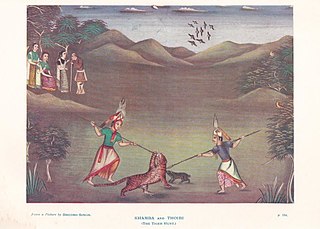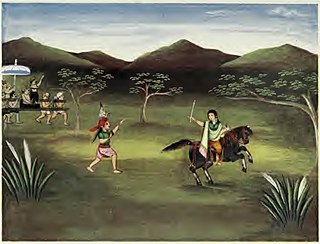
Moirang is a town in the Indian state of Manipur, best known for the tentatively listed UNESCO World Heritage Sites of the Keibul Lamjao Conservation Area (KLCA), covering Keibul Lamjao National Park (KLNP), the world's only floating national park, the buffer of Loktak Lake and Pumlen Pat. It is best known for the being the place of origin of the ancient epic legend of Khamba and Thoibi, one of the seven epic cycles of incarnations of Meitei mythology and folklore. Nationwide, it is also famous for the INA War Museum in the INA Martyrs' Memorial Complex, where Colonel Shaukat Malik of the Indian National Army hoisted the Tricolour for the first time on Indian soil on 14 April 1944. It is situated approximately 45 km (28 mi) south of the state capital Imphal. It has an area of 269 km2 (104 sq mi) with a population of 62,187 in 67 villages. There are 12 Panchayats in this block.

Meitei literature, also known as Manipuri literature, is literature written in the Meitei language of Manipur. An ancient institution of learning, the Luwang Nonghumsang, later known as the Pandit Loishang, collected sources of indigenous Meitei knowledge and philosophy until the 18th century. Writing by Meiteis is assumed to go back to the Kingdom of Kangleipak in the early 12th century. The Meitei script is a Brahmic abugida. It is known only from the Puya manuscripts discovered in the first half of the 20th century. Manuscripts of the 18th and 19th centuries were written using the Bengali alphabet. The existence of the Meitei script in the 15th-century hinges on the authenticity of an inscription dated to the reign of Senbi Kiyamba. The first printed Manipuri book, Manipurer Itihas, appeared in 1890 from the Baptist Mission Press, Calcutta. Though the kings of Manipur had established contact with the British from the middle of the eighteenth century onward the real impact of the contact came much later. Johnstone Middle English School, based on the western system of education, was started in 1885 at Imphal, and in 1891 Manipur lost its independence to the British. British domination facilitated the introduction of new systems in the civil, political and educational spheres, which hastened the process of modernization in Manipur, exposed as it was to new ideas and influences.
The Khamba Thoibi Sheireng, also spelled as the Khamba Thoibi Seireng, is a Classical Meitei language epic poem based on the ancient love story of Khuman prince Khamba and Moirang princess Thoibi of Ancient Moirang kingdom of Ancient Kangleipak. It is the magnum opus of Hijam Anganghal, the "Bard of Samurou". It is regarded as the national epic of the Manipuris. It is regarded as the greatest of all the epic poems in Meitei literature, with 39,000 verses, thereby being the third longest Indian epic poem, next to the Mahabharata and the Ramayana.

Numit Kappa is an ancient Meitei language mythological epic literary work. The work is believed to be written around or before 33 AD. It is written in the form of partial poetry and partial prose.

Loyalakpa is a God in Sanamahism, the indigenous religion of Manipur. He is best known for wrestling with Khoriphaba during the Lai Haraoba festival. He is the consort of goddess Thoudu Nungthel Leima. He is one of the ten kingly gods in Meitei religion.

Thangching or Thangjing is a primordial deity in Sanamahism, the indigenous religion of Manipur. He is the ruling deity of the Moirang dynasty. He rules supreme on the banks of the landlocked sea, Loktak lake. He is one of the four cardinal Umang Lais. The guardianship of the south western direction is alluded to Thangjing and the other directions to Koubru, Marjing and Wangbren.

Khuman Khamba or Moirang Khamba is a hero in Meitei folklore. He belongs to the Khuman clan. He is the hero as well as the protagonist of the Meitei epic poem Khamba Thoibi of the Moirang Shayon legends in the Moirang Kangleirol genres from Ancient Moirang. He is the son of nobleman Puremba, the then prime minister of the ancient Moirang Kingdom. He became an orphan at a very young age when his parents died. He was raised in poverty by his elder sister Khamnu. Later, he married princess Thoibi of Ancient Moirang kingdom.

Kao is a legendary divine bull captured by Khuman Khamba in Meitei mythology and folklore of ancient Moirang realm. It appears in the legend of Kao Phaba, also known as Khambana Kao Phaba of the Khamba Thoibi epic.

In Meitei mythology and folklore, the epic cycles of incarnations in Moirang is a cyclic epic of seven incarnations of two divine lovers in the kingdom of Moirang in the realm of Ancient Kangleipak.

The ancient legend of Khuyol Haoba and Yaithing Konu is one of the epic cycles of incarnations of Meitei mythology and folklore, that is originated from Moirang kingdom of Ancient Kangleipak. It concerns the fateful love of Khuyol Haoba, an orphan man, for the beautiful Yaithing Konu. Khuyol Haoba was the son of late Khundouremba, a court official of Moirang. Yaithing Konu was the daughter of Luwang Huiningsumba, an influential nobleman of Moirang.

The ancient legend of Ura Naha Khongjomba and Pidonnu is an epic cycle of incarnations of Meitei mythology and folklore from the Moirang kingdom of Ancient Kangleipak. It concerns the love and adventures of the forgotten prince Ura Naha Khongjomba for the beautiful woman Pidonnu.

The ancient legend of Wanglen Pungdingheiba and Sappa Chanu Silheibi is one of the tales of incarnations described in the Moirang Shayon. Moirang was an independent kingdom, but later became a province of Manipur. It concerns the tragi-comic romantic adventures of Wanglen Pungdingheiba for his ladylove Sappa Chanu Silheibi). Wanglen Pungdingheiba was a skilled craftsman known for making musical instrument pung. Lady Sappa Chanu Silheibi was a skilful weaving artisan. Both the lovers are equally noted for their talents and good looks, thereby becoming the matters of envy of many young men and women in the kingdom of Moirang.

Khamnu (/kʰəm.nu/) is a figure in Metei legend and folklore. She appears in the epic poem Khamba Thoibi. She is the daughter of prime minister Khuman Puremba of Ancient Moirang. Biologically, she is a daughter of King Chingkhu Telheiba of Ancient Moirang. She is the older sister of Khuman Khamba. She is best known for raising her younger brother when he was a child. The two siblings became orphans during their infancy. Khamnu feared evil plots, she took her younger brother and fled her home town. They took refuge in the village of the Kabui chief in the hills.

The ancient legend of Khamba and Thoibi is a classic, as well as one of the epic cycles of incarnations of Meitei mythology and folklore, that is originated from Ancient Moirang kingdom of Ancient Kangleipak . It is referred to as the "national romantic legend of Manipur" by Indian scholar Suniti Kumar Chatterjee.

Khamba Thoibi Jagoi, also known as Khamba Thoibi classical dance or Khamba Thoibi ballet, is a traditional Meitei ritualistic and theatrical classical dance form, which is usually enacted as a part and parcel of the Lai Haraoba performances, dedicated to God Thangching, the national deity of Ancient Moirang realm. Notably, it is one of the cultural elements, giving inspirations to the development of the Manipuri Raas Leela classical dance drama form.

The Khoirentak tiger was a vicious monster in Meitei mythology that lived in Khoirentak. It was eventually killed by Khuman Khamba. The tiger caused havoc to the people of the Khoirentak in Ancient Moirang, thereby becoming the "man eater" of the region. Finally, Khuman Khamba and Nongban were ordered by the king, to catch the beast. In the first encounter, Nongban was killed by the tiger and at the final meet, Khuman Khamba successfully captured and killed it. Finally, when he brought it to the capital city of Ancient Moirang, Thoibi was given to him, hand in marriage.

Angom Nongban Kongyamba, known by just one name as Nongban, is a nobleman in Ancient Moirang. He is a rich man of Angom clan. He is the main villain in the Khamba Thoibi epic legend. He was a polygamist. He wanted to marry Princess Thoibi in addition to his other wives. Prince Chingkhuba, Thoibi's father, agreed to give him the princess' hand in marriage. However, Thoibi was in love with Khuman Khamba. So, he and Chingkhuba thought of many ways to stop Khuman Khamba. But none of their plans worked.

Animals have significant roles in different elements of Meitei culture, including but not limited to Meitei cuisine, Meitei dances, Meitei festivals, Meitei folklore, Meitei folktales, Meitei literature, Meitei mythology, Meitei religion, etc.

Kumcha Lempi, also known as Kumja Lembi, is a woman in Meitei mythology and folklore of ancient Kangleipak. She is known for being a victim of an attack by a tiger in Khoirentak. Her tragedy is frequently mentioned, narrated and retold in the Moirang Kangleirol legends, usually by the Pena playing balladeers till present times.

















